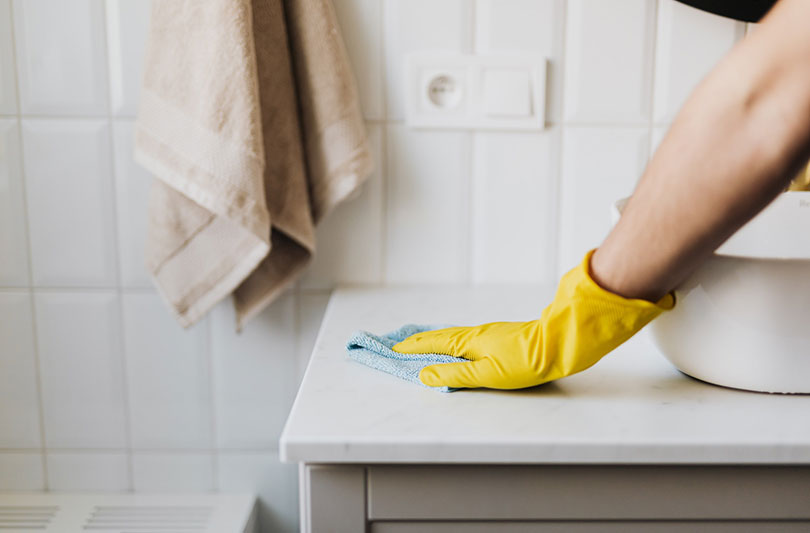If your home is in a hard water area, such as East Anglia, you’ll probably have noticed staining on surfaces that come into contact with water. Whether these hard water stains are in your shower tray, on your drinking glasses, or even on your beautiful natural stone tiles, they can take a bit of effort to remove, and are best avoided if possible. We have some top tips on how to remove hard water stains from your home surfaces.
Hard water stains on glass
Crystal clear glass can be really beautiful. But not if it’s covered in stains from hard water deposits. Keeping glass sparkling is never easy but leaving stains for too long can result in permanent marks.
How to remove hard water stains from glass
You might be surprised to find hard water deposits on your windows but this can happen if they aren’t dried properly after cleaning. The most common place to find hard water stains on glass is your shower screen but if you live in a hard water area, wherever you put water and glass together you’ll find staining.
We recommend starting gently with your hardwater cleaning efforts.
- Mix distilled white vinegar in equal parts with water
- Spray this solution onto your glass
- Wait for 30 minutes
- Rub firmly in circles using a soft brush or cloth
- Use an old toothbrush for hard-to-reach areas
- Rinse the glass and dry it off
If the method above hasn’t removed all of the hard water stains, the cleaning paste below adds an abrasive touch.
- Spray the glass with a water vinegar solution as before
- Make a paste of one part water to three parts bicarbonate of soda
- Rub the paste into stubborn stains. Leave it until it starts to dry
- Spray on the water vinegar solution again (expect it to foam)
- Rinse the glass and dry it off
Both the methods above can also be used in the bathroom to remove hard water stains from toilets, sinks and bathtubs.
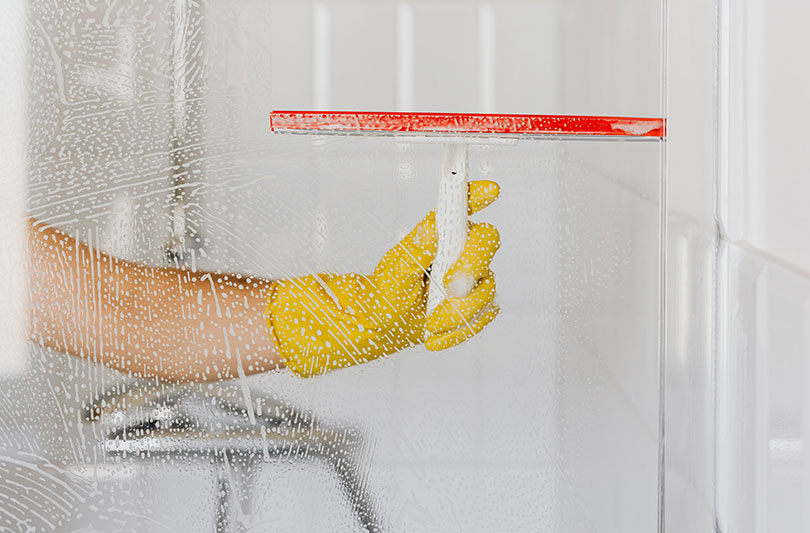
Hard water stains in your bathroom
You’re most likely to notice hard water stains in your bathrooms. This is because most bathroom surfaces get wet at least once a day. Wiping surfaces dry can help but this isn’t always possible. We’ve already mentioned removing hard water stains from toilets, sinks and bathtubs. Our tips below will help you deal with hard water stains in your shower, on tiles and on taps.
How to remove hard water stains from shower heads
Hard water can have an impact on the efficiency of your shower head. If you’ve noticed a reduction in water pressure, hard water deposits are probably clogging up the small holes the water comes through. It’s almost impossible to keep this area dry so the cleaning method below is really important.
- Remove the shower head if you can
- Scrub the water holes carefully using white vinegar and a toothbrush
- Avoid soaking your shower head in vinegar as it can mark some finishes
- Wipe off the vinegar then blast water through for a good rinse
If you want to know how to remove hard water stains from taps, the method above works well for these too.
How to remove hard water stains from bathroom tiles
The appearance of beautiful tiles and grouting can be spoilt by hard water stains. Grout is easily damaged so don’t scrub it with coarse scrubbers or abrasive powders. The same is true for some tiles. The steps you need will depend on where your tiles are. Use a 1:1 solution of water and white vinegar.
Warning – if you’re thinking about using this method on a specialist surface, make sure you test a really small area first.
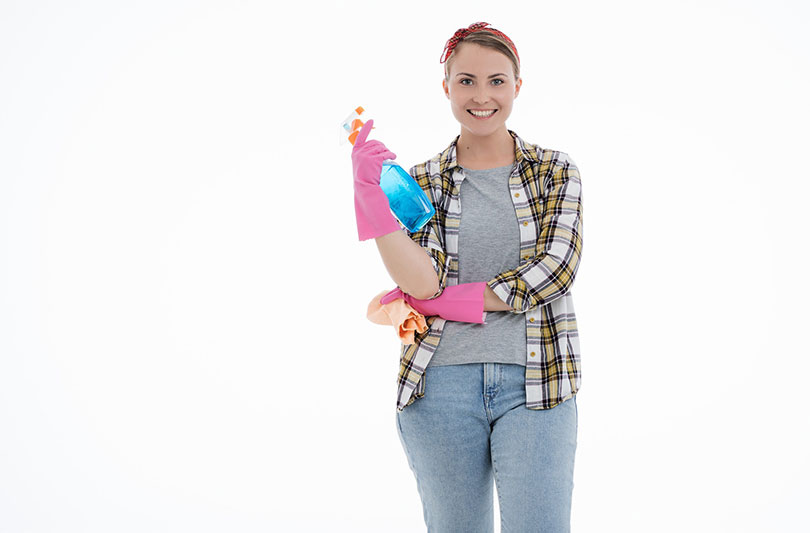
For badly stained tiles on shower floors
- Dry the area you want to clean
- Place a layer of paper towels on the tiles.
- Soak the paper with the vinegar and water solution.
- Remove the paper after at least eight hours.
- Rinse and dry the area.
For lesser stains or tiles on walls
- Spray the tiles with the vinegar and water solution
- Leave for at least 30 minutes
- Try wiping off a test section
- Leave longer if necessary
- Wipe, rinse and dry
If you want to remove hard water stains from porous natural stones such as marble or granite, avoid using vinegar because it is too acidic. With specialist surfaces such as these, it’s best to refer to your supplier for cleaning advice.
How to remove hard water stains from shower walls
More people are choosing acrylic shower walls instead of tiles. Whilst this is a low maintenance solution, shower walls can become stained from hard water deposits. Follow the steps below for a safe, easy cleaning solution.
- Mix a 1:1 ratio of water and white vinegar
- Test the solution on a small section of your shower wall.
- Spray the vinegar mixture generously.
- Wipe gently avoiding any abrasive action.
- Rinse with water then dry.
- Washing up liquid is also gentle enough to clean your acrylic shower wall.
Hard water stains in your kitchen
There’s always water in the kitchen so it’s no wonder this area of the home is also vulnerable to hard water stains. From your dishwasher to your utensils, hard water can have an impact on lifespan as well as appearance.
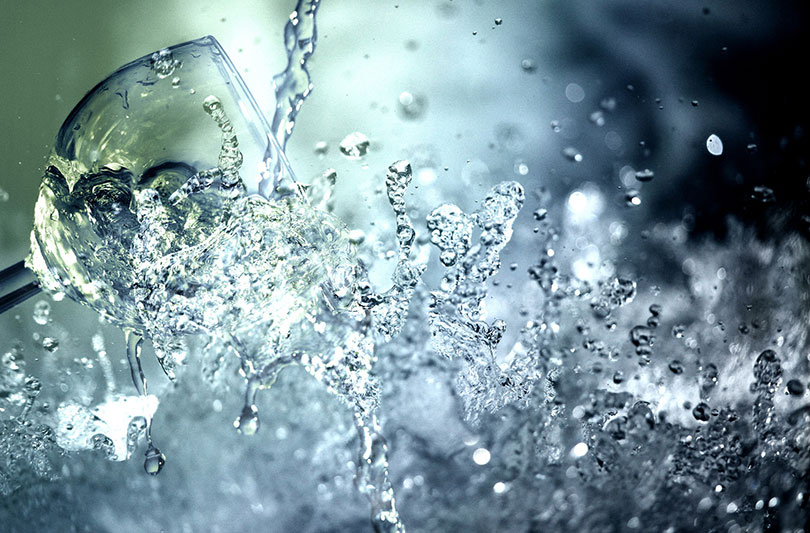
How to remove hard water stains from drinking glasses
Drinking glasses with hard water deposits have a foggy appearance. You need to check first that your dishwasher hasn’t damaged the glass but if you live in a hard water area, it’s just as likely you’ll be able to remove the stains using the method below.
- Soak the glasses in white vinegar for five minutes
- Rub off any remaining hard water stains with bicarbonate of soda
- Rinse the glasses, and dry them well
How to remove hard water stains from stainless steel
Stainless steel sinks are better at resisting hard water stains than some surfaces but they can have issues. If you’ve noticed dirty water-like drops, these are almost certainly hard water deposits.
- Apply pure white vinegar to a soft cleaning cloth
- Gently rub the stained areas until the hard water stains disappear
- Rinse and dry
If you’re looking for information on how to remove hard water stains from plastic, the method above should work. You can also soak smaller plastic items in a 1:1 water and vinegar mix.
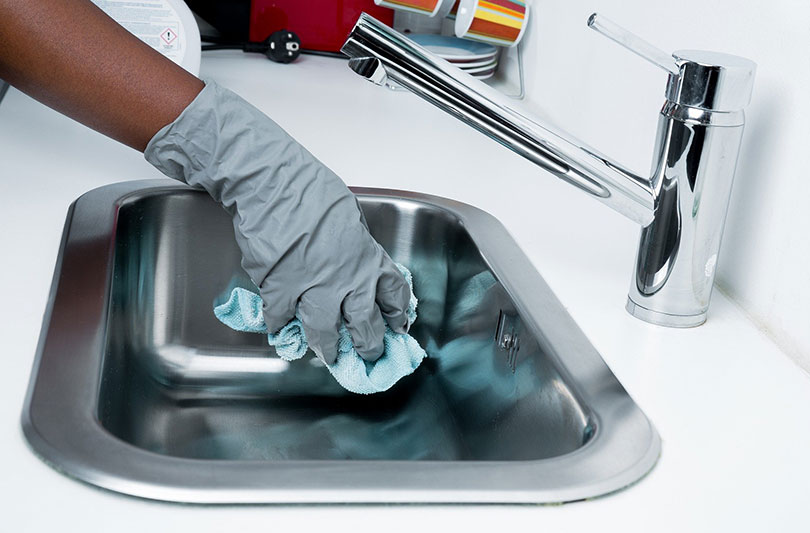
Prevent hard water stains before they become a problem
You should get good results from our hard water cleaning methods but they all take time and effort. Even worse, the same mineral deposits can cause damage to your water pipes and appliances.
By far the best way to prevent hard water problems in your home is to have a water softener fitted by experts. At Hart Water we offer competitive pricing on a range of filters, taps and water softeners including installation, service and repair. We’re looking forward to putting our years of experience at your service. Get in touch today, and ask about our water softener free survey.
- Water Softener Size Guide: How to Select the Perfect Fit for Your Home or Business - February 25, 2025
- Under Sink vs Whole House Water Filters: The Complete Homeowner’s Guide - November 27, 2024
- 7 Surprising Ways Water Softeners Transform Your Skin: Unveiling the Secret to Radiant Complexion - July 17, 2024

